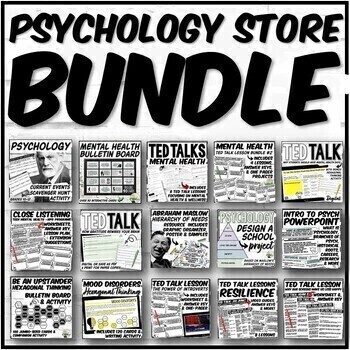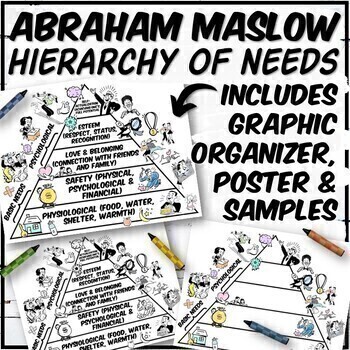Psychology Store Growing Bundle
- Zip

Products in this Bundle (78)
showing 1-5 of 78 products
Description
This Psychology bundle includes over 70 resources from my Psychology store designed to enhance understanding and engagement in your classroom. Resources are aligned with Wisconsin Social Studies standards. Ideal for high school Psychology or Health educators. This is a growing resource.
Please note that this resource does not constitute a full course. The price of this bundle is subject to increase as new materials are added. However, purchasing now ensures access to all future additions at no extra cost. The current pricing takes into account that this is an evolving bundle with some unit gaps yet to be filled.
Bulletin Board Displays, Word Walls, and Timelines (8):
Mental Health Awareness Interactive, Mental Health Hexagonal, Upstanders Interactive, Upstanders Hexagonal, LGBTQ+ Awareness, Domestic Violence Awareness, Study Skills, Academic Terms & SEL
TED Talk Lessons
The 3-Step Guide To Believing In Yourself, Sheryl Lee Ralph.
Depression: The Secret We Share, Andrew Solomon
Feats of Memory Anyone Can Do, Joshua Foer
Getting Stuck in the Negatives (and How to Get Unstuck), Allison Ledgerwood
Grit: The Power of Passion and Perseverance, Angela Duckworth
How Acts of Kindness Sparked a Global Movement, Asha Curran
How AI Could Save (Not Destroy) Education, Sal Khan
How Boredom Can Lead To Your Most Brilliant Ideas, Manoush Zomorodi
How Childhood Trauma Affects Health Across a Lifetime, Nadine Burke Harris
How Gratitude Rewires Your Brain, Christina Costa
How to Find Humor in Life's Absurdity, Maira Kalman
How To Get Better At The Things You Care About, Eduardo Briceño
How To Make Learning As Addictive As Social Media, Luis Von Ahn
How To Overcome Our Biases? Walk Boldly Toward Them, Vernā Myers
How To Stay Calm When You Know You'll Be Stressed, Daniel Levitin
Inside the Mind of a Master Procrastinator, Tim Urban
Overcoming Hopelessness, Nick Vujicic
Texting That Saves Lives and How Data From a Crisis Text Line is Saving Lives, Nancy Lublin
To This Day ... for the bullied and beautiful, Shane Koyczan
WARNING: Language some might find offensive is included in this TED Talk. It may not be appropriate for middle school students.
CLEAN (SCHOOL) VERSION: https://www.youtube.com/watch?v=rIBosgwzwlo
The 8 Secrets of Success, Richard St. John
The Joy Of Learning Random Things On Wikipedia, Annie Rauwerda
The Power of Introverts, Susan Cain
The Puzzle of Motivation, Daniel Pink
The Rise of the "Trauma Essay" in College Applications, Tina Yong
The Surprising Habits of Original Thinkers, Adam Grant
Want kids to learn well? Feed them well, Sam Kass
What I Learned from 100 Days of Rejection
What It Takes To Be A Great Leader, Roselinde Torres
What's Your Leadership Language, Rosita Namjmi
Why Great Leaders Take Humor Seriously, Jennifer Aaker and Naomi Bagdonas
Why Our Screens Make Us Less Happy, Adam Alter
Why Having Fun is the Secret to a Happier Life, Catherine Price
Why We All Need to Practice Emotional First Aid, Guy Winch
Why Students Should Have Mental Health Days, Hailey Hardcastle
Why You Should Define Your Fears Instead of Your Goals, Tim Ferriss
Why Some of Us Don't Have One True Calling, Emilie Wapnick
Your Body Language May Shape Who You Are, Amy Cuddy
TED-Ed Video Guide
Why You Procrastinate Even When It Feels Bad TED-Ed Video Guide
Hexagonal Thinking (3)
Mood Disorders, Growth Mindset, Stamped: Racism, Antiracism, and You
PowerPoints (7)
Crash Course Psychology Episode Guides
Crash Course Psychology: Intro to Psychology Ep. 1 Video Guide
Crash Course Psychology: Psychological Research Ep. 2 Video Guide
Crash Course Psychology: Sensation and Perception Ep. 5 Video Guide
Crash Course Psychology: The Power of Motivation Ep. 17 Video Guide
Crash Course Psychology: Adolescence Ep. 20 Video Guide
Crash Course Psychology: Measuring Personality Ep. 22 Video Guide
Crash Course Psychology: OCD and Anxiety Disorders Ep. 29 Video Guide
Crash Course Psychology: Depressive and Bipolar Disorders Ep. 30 Video Guide
Crash Course Psychology: Schizophrenia and Dissociative Disorders Ep. 32 Video Guide
Crash Course Psychology: Prejudice and Discrimination Ep.39 Video Guide
Crash Course World Mythology Freud, Jung, Luke Skywalker, & Psychology of Myth Ep. 40
Additional Resources
PBL Activities, Close Listening Exercises, Graphic Organizers, One-Pager Projects, Gallery Walk, WebQuests, Meet the Teacher Templates, Syllabus Templates





